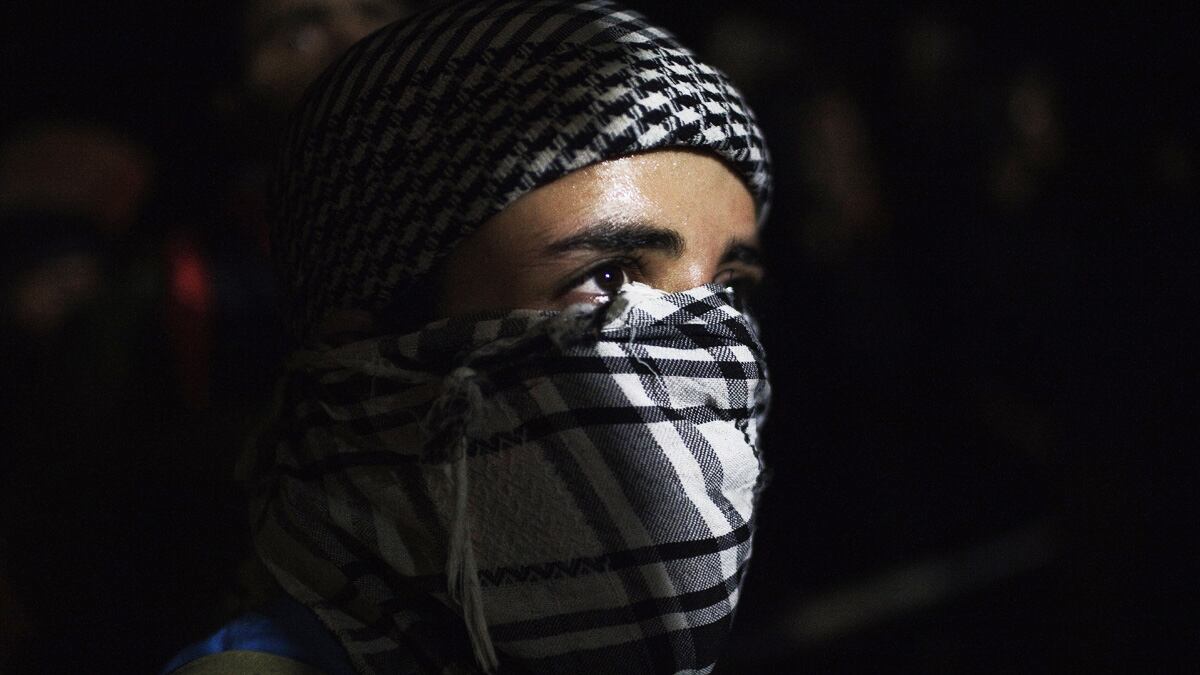Anas Mohamed had just hung up the phone when he heard a rapping at the door.

Twisting the handle, a man suddenly burst in and clubbed him across the head with a blunt, heavy object.
Anas tumbled to the floor. The intruder then sprayed a substance into his face from a gas canister, after which the young graphic designer—who lived alone in his flat in northeast Cairo—fell unconscious.
It was the start of a bewildering, weeklong nightmare for the 23-year-old, who described his ordeal—day after day at the mercy of Egypt’s shadowy security services—to The Daily Beast. Waking up, he found himself handcuffed on the floor in a tiny, two-square-meter gray cell with no windows and a hefty iron door. A man was restraining him from behind while, to his horror, he said, he saw another leaning in to jab a syringe into his arm.
Released last month, the experience convinced Anas—along with a number of Egyptian activists—that, despite last year’s revolution, the country’s notorious security forces are alive and well.“This is a new phenomenon,” he said, as he sat in a cafe in the district of Ezbet el-Nekhl. “Before the revolution, if the government came to take you, people would know about it. But now people can be taken from the street and disappear.”
During his ordeal, Anas said, he began to experience vivid hallucinations as a result of the injections. A medical report written after his release confirmed the presence of large amounts of tramadol and other substances in his body, he says. “I think it was so that if I died, they could say it was because of drug abuse,” he said.
Over the past year, several other mysterious cases of kidnappings—allegedly conducted by Egypt’s secret police—have been documented. It led one NGO last month to claim that the government was continuing to “terrorize” activists using a sinister campaign of abductions.
The No to Military Trials group, an organization that has worked to highlight the cases of Egyptians who were arrested under martial law following the downfall of Hosni Mubarak, cited a “growing number of cases” where political activists have been abducted, imprisoned, and subject to “physical and psychological abuse” by their jailors.
“It reminds us of the methods of intimidation used by State Security under Mubarak’s rule,” the group said in a statement.
In the wake of Mubarak’s ouster last year, officials announced that the State Security Investigations (SSI)—the widely loathed institution that for years was responsible for torturing activists and regime opponents—would be disbanded.
It was replaced by a new body, renamed National Security, which the government announced would now focus on national security and drug trafficking.
Yet according to Ragia Omran, a lawyer from the Cairo-based Hisham Mubarak Law Center, aside from a few cosmetic patch-ups, very little has changed.
“There have been announcements from the governments that have been in place since February last year,” she said. “They talked about restructuring and getting rid of the top officers. But nothing has changed. The way they treat citizens is still inhuman.”
Bahey el-Din Hassan, director of the Cairo Institute for Human Rights Studies, agreed. “Of course they are still working,” he said. “But they are keeping a low profile.”
In a meeting last month with former Interior Minister Mohamed Ibrahim, Hassan submitted a memo calling for reform of the security services. “State Security should not spy on the Egyptian people,” he told The Daily Beast.
In addition to the kidnappings, large numbers of people have “disappeared” over the past year.
According to a recently launched campaign group called Hanlayhom, which means “we will find them” in Arabic, around 1,200 people have vanished without a trace since the fall of Mubarak. Many were arrested by the military during anti-government demonstrations, while others simply disappeared with no explanation.In one instance, a 15-year-old boy reappeared earlier this month after spending several months inside a military prison. His family had heard nothing about him since he went missing.
In another heart-breaking case, a young man called Mohamed Sadiq went missing during the early stages of the Egyptian uprising. His mother tried calling his mobile for weeks, but could not get through to anyone, according to the campaign group.
Eventually, after two months, a soldier picked up. He said he had found Sadiq’s phone deep in the desert close to the location of a military base. He had no idea where the woman’s son was.
There is little direct evidence linking remnants of Egypt’s State Security with the disappearances. Indeed, the hundreds of cases took place during a time when the military was involved in many crackdowns on demonstrations and implicated in a number of high-profile examples of torture and brutality.
According to Karim Medhat Annarah, a researcher on security sector reform for the Egyptian Initiative for Personal Rights, State Security began to take a lower profile during the transitional period in which the Supreme Council of the Armed Forces (SCAF) held sway. Many of its responsibilities were subsequently pawned off onto the military. “Their work is not very visible anymore,” he said.
Instead, the most serious obstacle to reform comes not from the National Security forces, he suggested, but from the police.
“They were in charge of day to day policing, crime prevention, and crime fighting,” he said. “In terms of the abuses they carried out, it was much higher than State Security.”
He argued that the police force was in need of root and branch reform, beginning with a change in mentality at Egypt’s police academy, and extending to reining in officer powers and instituting pay raises to prevent corruption.
Hassan, of the Cairo Institute for Human Rights Studies, meanwhile suggested that the best way to reform the security services was to establish an oversight committee comprised of judges and human-rights workers.
Yet reform will not be easy. According to Nermine Yosri from Hanlayhom, politicians are wary of resurrecting Egypt’s revolutionary ghosts. “Nobody cares about the missing people cases,” she said. “The political parties, government, and some NGOs don’t care. We’re working alone.”
Annarah said that for many in power, the issue simply isn’t a priority. “We don’t have the key allies in government who believe now is the time to hold people accountable.”
Nevertheless, he held out hope that some form of justice would eventually prevail. “A couple of months ago people would never have expected that Field Marshal Hussein Tantawi would be deposed,” he said. “You never know when we might have a breakthrough in accountability.”
An earlier version of this article stated that Bahey el-Din met with Interior Minister Ahmed Gamal. El-Din met with former Interior Minister Mohamed Ibrahim.





